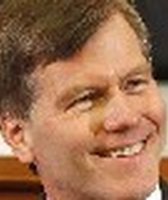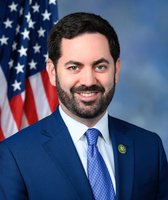Stand up for the facts!
Our only agenda is to publish the truth so you can be an informed participant in democracy.
We need your help.
I would like to contribute
Claim spending rose under fiscal cliff deal misses half the story
As the nation gears up for more debates on the budget, we here at PolitiFact Georgia figure we’d better sort out what happened during the last one.
Thanks to the fiscal cliff deal passed by Congress on New Year’s Day, a series of automatic spending cuts and tax hikes designed to pressure legislators into acting on the federal budget won’t go into effect until March.
Lawmakers may have agreed to pass the the American Taxpayer Relief Act of 2012, but they don’t agree on what it did.
Some supporters said the deal cut spending. But U.S. Rep. Tom Price, a Roswell Republican, begged to differ.
"My assessment was that it ultimately raised taxes and didn’t decrease any spending. In fact, it increased spending," Price said during a Jan. 2 interview on WMAL-FM, a Washington-area radio station. He voted against the deal.
So which one is it? A spending increase or cut?
A prior PolitiFact check addressed Price’s claim on taxes and found it was Half True. It’s valid to see the deal as a tax cut or an increase.
Thanks to the deal, our taxes are lower than if Congress allowed the nation to fall off the fiscal cliff and stay there. But we’re paying more taxes than we did in 2012.
So, we wondered, is the deal’s impact on spending a matter of perspective as well?
For the most part, yes.
Compared with what would have happened without a deal, it’s a spending increase.
As we mentioned before, the old statute required automatic spending cuts on Jan. 1. If this law stayed in place, outlays would have totaled nearly $47. 4 trillion over 10 years, according to estimates from the nonpartisan Congressional Budget Office, which measures the impact of legislation on the budget.
Passage of the deal pushed the CBO’s estimate to more than $47.7 trillion, a spending boost of about $330 billion.
But compared with what the federal government spent in 2012, the deal is a cut, CBO figures show.
The agency calculated spending changes based on an "alternative fiscal scenario" in which 2013 outlays would have stayed roughly the same as they were in 2012.
Using this baseline, spending would have topped $50 trillion through 2022. Spending under the deal is about $2.3 trillion lower.
Now here’s where things get complicated. Even when analysts use the same baseline, estimates on the deal’s spending impact can vary by tens of billions of dollars.
Consider estimates by the conservative Heritage Foundation and the liberal Center on Budget and Policy Priorities.
They compared spending under the fiscal cliff deal with the former law.
As we said above, the fiscal cliff deal is a spending increase if you use this baseline.
The Heritage Foundation found that the deal increased spending by $47 billion over 10 years. This is proof that Congress has not gotten serious about cutting the budget, said Patrick Louis Knudsen, a senior fellow in federal budgetary affairs at the think tank.
"As dollar amounts go, it’s not a very large amount," Knudsen said. "But as a matter of principle it is."
On the other hand, the CBPP estimates that the increase is closer to $3 billion over 10 years. The group concluded it was not a significant increase.
Analyses differ because they tally certain spending line items differently. But in the world of trillion-dollar federal budgets, this $44 billion gap is not a major one.
"With so much money being spent, whether spending goes up by $3 billion or $47 billion is a rounding error," said Howard Gleckman, an Urban Institute budget expert. "We will never know who is right. I just say the deal barely changed spending from CBO's projections."
One last thing. As we mentioned in our prior fact check on the tax portion of Price’s claim, the trick is to make sure you don’t mix up your baselines.
If your analysis compares current spending with expenditures in 2012, use the same baseline for taxes as well, experts told us.
Price runs into trouble on this front. His conclusion that taxes rose is valid compared with the amount paid in 2012. But from this perspective, spending is actually down.
Once again, we come to the conclusion that Price is both right and wrong.
If Congress had failed to change the law in 2012 that sent the country off the fiscal cliff, federal spending would be lower than it is now.
But if spending had stayed at 2012 levels, it would be higher.
Price’s claim on spending is technically accurate. But he leaves out critical information. And he mixes his budget baselines to make a point. In our book, that’s a Half True.
Our Sources
The Atlanta Journal-Constitution, Political Insider blog, "Tom Price: The U.S. House needs ‘red state’ leadership," Jan. 2, 2013
Congressional Budget Office, "The ‘Fiscal Cliff’ Deal," Jan 4, 2013
The Heritage Foundation, "Morning Bell: 13 Tax Increases in 2013," Jan. 8, 2013
Congressional Budget Office, "Estimate of the Budgetary Effects of H.R. 8, the American Taxpayer Relief Act of 2012," Jan. 1, 2013
Joint Committee on Taxation, "Estimated Revenue Effects Of The Revenue Provisions Contained In An Amendment In The Nature Of A Substitute To H.R. 8, The ‘American Taxpayer Relief Act Of 2012,’ As Passed By The Senate On January 1, 2013," Jan. 1, 2012
Tax Policy Center, Federal Revenues and Outlays Under Various Scenarios, 2012-2022, Jan. 1, 2013
U.S. Government Printing Office, American Tax Relief Act of 2012, www.gpo.gov/fdsys/pkg/BILLS-112hr8enr/pdf/BILLS-112hr8enr.pdf
The Heritage Foundation, "Fiscal Cliff Deal Added $47 Billion in Spending," Jan. 10, 2013
Center on Budget and Policy Priorities, "The Next Act: Further Deficit Reduction Must Include a Mix of Revenues and Spending Cuts," Jan. 2, 2013
Email interview, Joshua Gordon, policy director, Concord Coalition, Jan. 8, 2013
Email interview, Howard Gleckman, resident fellow, Tax Policy Center, Urban Institute, Jan. 9, 2013
Email interview, Ryan Murphy, spokesman, U.S. Rep. Tom Price, Jan. 8 and Jan. 9, 2013
Telephone interview, Patrick Louis Knudsen, Grover M. Hermann Senior Fellow in Federal Budgetary Affairs, Heritage Foundation, Jan. 11, 2013
Browse the Truth-O-Meter
More by Willoughby Mariano
Claim spending rose under fiscal cliff deal misses half the story
Support independent fact-checking.
Become a member!
In a world of wild talk and fake news, help us stand up for the facts.































































